
Last modified: 2013-11-05 by zoltán horváth
Keywords: republic of anguilla | mermaid | invasion | drug |
Links: FOTW homepage |
search |
disclaimer and copyright |
write us |
mirrors

This is the first flag of Anguilla Island when this island
proclaimed its independence. Between 12 and 23 July 1967, Anguilla
did not have a flag but on 23 July 1967 was adopted a flag named
“Mermaid flag”, which was in use until 29 September 1967, when
the Dolphin flag was introduced. (Source:
[smi91s])
Jaume Ollé, 27 Sep 1996
This flag was manufactured at the request of an Anguillan friend
of the owner of the Paramount Flag Company of San Francisco, CA, USA.
They were made by silk-screening the mermaid emblem onto the blue
fabric and then appliquéing that in an oval onto the red background,
and then adding the lettering to the front and back. The mermaids
were done entirely in a white line drawing on blue, there was no
black with white on the mermaids. It was not Paramount’s policy
to have cut a screen for only one flag. My best guess is that a
minimum of 24 and a likely maximum of 50 flags were produced.
Jim Ferrigan, 11 Dec 2002
A sinister plot later emerged whereby drug barons were accused of attempting to take over the island’s government to use it as a base for their activities. Although probably just a convenient fictional cover, this was the reason given by the British for their “invasion” of Anguilla in 1969. Anguilla thereby joined the very short list of nations (Rhodesia being the other one) to have returned to British rule having experienced a period of independence, albeit unrecognized.
Vexillographically, the Mermaid flag is in my humble opinion is total mess — any flag which has to have the name of the country in huge letters across it surely lacks any meaningful symbolism. (The dolphin flag on the other hand, is a beautiful piece of vexillography.)
Stuart Notholt, 29 Sep 1996

The page about flags at the
anguillan official government website includes a
50¢ anguillan postage stamp showing
a somewhat different image, without lettering and with dark purple
background.
António Martins, 24 Sep 2002